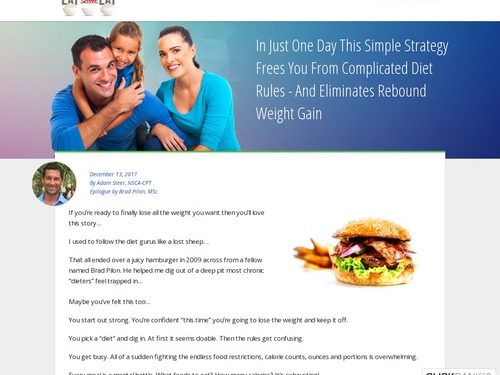Product Name: Eat-Stop-Eat
Click here to get Eat — STOP — Eat at discounted price while it’s still available…
All orders are protected by SSL encryption – the highest industry standard for online security from trusted vendors.

Eat — STOP — Eat is backed with a 60 Day No Questions Asked Money Back Guarantee. If within the first 60 days of receipt you are not satisfied with Wake Up Lean™, you can request a refund by sending an email to the address given inside the product and we will immediately refund your entire purchase price, with no questions asked.
The world of dieting and nutrition can be a confusing landscape. Every day, it seems there’s a new “miracle” diet promising rapid weight loss and improved health. Amidst all this noise, one concept stands out for its simplicity and potentially sustainable approach: the Eat-Stop-Eat intermittent fasting method. But what exactly is Eat-Stop-Eat, and is it right for you? This comprehensive guide will delve deep into the details, providing you with the information you need to make an informed decision.
What is Eat-Stop-Eat Intermittent Fasting?
Eat-Stop-Eat, popularized by Brad Pilon, is a form of intermittent fasting that involves one or two non-consecutive 24-hour fasts per week. Unlike daily intermittent fasting protocols like the 16/8 method, Eat-Stop-Eat focuses on longer periods of abstinence from food. This approach aims to create a caloric deficit, leading to weight loss and potentially unlocking various health benefits associated with fasting.
The fundamental principle is simple: you choose one or two days a week (e.g., Monday and Thursday) where you completely refrain from eating for 24 hours. This means if you finish dinner at 7 pm on Monday, you wouldn’t eat again until 7 pm on Tuesday. On the remaining days of the week, you eat normally, without restricting your calorie intake. Crucially, ‘eating normally’ implies consuming nutritious foods and avoiding excessive junk food to maximize the benefits of the program.
How Does Eat-Stop-Eat Work?
The effectiveness of Eat-Stop-Eat hinges on the principle of calorie restriction. By fasting for 24 hours, you significantly reduce your weekly calorie intake, forcing your body to tap into stored energy (fat) for fuel. Beyond weight loss, Eat-Stop-Eat can trigger several metabolic changes, including:
- Increased Insulin Sensitivity: Fasting can improve your body’s response to insulin, potentially reducing the risk of type 2 diabetes.
- Cellular Repair (Autophagy): During periods of fasting, your body initiates a process called autophagy, where it cleans out damaged cells and regenerates new ones. This can contribute to overall health and longevity.
- Hormonal Changes: Fasting can influence hormone levels, such as increasing human growth hormone (HGH), which plays a role in muscle growth and fat loss.
Benefits of Eat-Stop-Eat
While research on Eat-Stop-Eat specifically is limited, studies on intermittent fasting, in general, suggest several potential benefits:
- Weight Loss: The primary benefit of Eat-Stop-Eat is weight loss. By creating a calorie deficit, you can effectively shed unwanted pounds.
- Improved Insulin Sensitivity: As mentioned earlier, intermittent fasting can enhance insulin sensitivity, which is crucial for blood sugar control.
- Potential for Longevity: Autophagy, triggered by fasting, may contribute to a longer and healthier lifespan.
- Simplicity and Flexibility: Eat-Stop-Eat is relatively easy to follow and can be adapted to your schedule. You can choose the fasting days that best suit your lifestyle.
- Mental Clarity: Some people report improved mental clarity and focus during periods of fasting.
- Reduced Inflammation: Studies suggest that intermittent fasting may help reduce inflammation in the body.
Drawbacks and Considerations
Eat-Stop-Eat is not without its potential drawbacks. It’s essential to consider these before embarking on this fasting method:
- Hunger and Discomfort: Fasting for 24 hours can be challenging, especially in the beginning. You may experience hunger pangs, fatigue, and irritability.
- Potential for Nutrient Deficiencies: If you’re not careful, you may miss out on essential nutrients during fasting days. It’s crucial to eat a balanced diet on non-fasting days.
- Not Suitable for Everyone: Eat-Stop-Eat is not recommended for pregnant or breastfeeding women, individuals with eating disorders, people with certain medical conditions (e.g., diabetes, kidney disease), or those taking certain medications. Consult your doctor before starting any new diet or fasting regimen.
- Muscle Loss: While intermittent fasting can help preserve muscle mass, there’s still a risk of muscle loss if you’re not consuming enough protein on non-fasting days or engaging in resistance training.
- Social Challenges: Fasting can be challenging in social situations, especially if you’re surrounded by food.
How to Do Eat-Stop-Eat Correctly
To maximize the benefits and minimize the risks of Eat-Stop-Eat, follow these guidelines:
- Consult Your Doctor: This is the most crucial step. Discuss Eat-Stop-Eat with your doctor, especially if you have any underlying health conditions or are taking medications.
- Start Slowly: Don’t jump into two 24-hour fasts right away. Begin with one fast per week and gradually increase the frequency if you feel comfortable.
- Choose Non-Consecutive Days: Avoid fasting on consecutive days to allow your body to recover.
- Stay Hydrated: Drink plenty of water, black coffee, or unsweetened tea during your fasting periods.
- Eat a Balanced Diet on Non-Fasting Days: Focus on consuming whole, unprocessed foods, including fruits, vegetables, lean protein, and healthy fats.
- Don’t Overeat After Fasting: Avoid the temptation to binge eat after a fast. Eat a normal-sized, nutritious meal.
- Listen to Your Body: If you feel unwell during a fast, break the fast and consult your doctor.
- Consider Supplementation: You may need to supplement with vitamins and minerals to ensure you’re meeting your nutritional needs. Talk to your doctor or a registered dietitian about appropriate supplements.
- Combine with Exercise: Incorporate regular exercise, including both cardio and resistance training, to maximize weight loss and muscle preservation.
Eat-Stop-Eat Review
Eat-Stop-Eat, in my opinion, is a potentially effective intermittent fasting method for weight loss and overall health improvement, but it requires a cautious and informed approach. Its appeal lies in its simplicity and flexibility compared to more restrictive diets. The fact that you only need to fast for 24 hours, one or two days a week, makes it easier to integrate into a busy lifestyle.
However, it’s crucial to acknowledge the challenges. The initial hunger and discomfort can be significant hurdles, and it’s essential to have a strong will and a well-defined plan to overcome them. It’s also not a magic bullet. Results depend heavily on what you consume during your non-fasting periods. If you use the “eat” part of “Eat-Stop-Eat” as an excuse to indulge in unhealthy foods, you’re unlikely to see the desired results.
Ultimately, the success of Eat-Stop-Eat depends on individual factors such as your health status, lifestyle, and commitment to the program. It’s not a one-size-fits-all solution, and it’s crucial to consult with a healthcare professional before starting.
Pros and Cons of Eat-Stop-Eat
Pros:
- Simple and Flexible: Easy to understand and adaptable to different schedules.
- Effective for Weight Loss: Creates a calorie deficit, leading to weight loss.
- Potential Health Benefits: May improve insulin sensitivity, promote autophagy, and reduce inflammation.
- No Calorie Counting Required on Non-Fasting Days: Allows for more freedom in food choices on most days of the week.
Cons:
- Can Be Challenging to Adhere To: Hunger and discomfort can make it difficult to stick to the fasting schedule.
- Potential for Nutrient Deficiencies: Requires careful planning to ensure adequate nutrient intake on non-fasting days.
- Not Suitable for Everyone: Contraindicated for certain individuals with specific health conditions.
- Risk of Muscle Loss: Requires adequate protein intake and resistance training to maintain muscle mass.
- May Lead to Overeating on Non-Fasting Days: The “eat” days can become an excuse to overindulge.
Eat-Stop-Eat: Frequently Asked Questions (FAQs)
1. Can I drink coffee or tea during my fasting period?
Yes, you can drink black coffee, unsweetened tea, and water during your fasting period. Avoid adding sugar, milk, or cream, as these can break the fast.
2. What can I eat or drink during the fasting period?
During the fasting period, you should only consume calorie-free beverages such as water, black coffee, and unsweetened tea. Avoid any foods or drinks that contain calories.
3. Will Eat-Stop-Eat cause muscle loss?
While there is a potential for muscle loss with any calorie-restricted diet, you can minimize this risk by consuming enough protein on non-fasting days and engaging in regular resistance training.
4. How often should I do Eat-Stop-Eat?
The recommended frequency is one or two non-consecutive 24-hour fasts per week. Start with one fast and gradually increase if you feel comfortable.
5. Is Eat-Stop-Eat safe for people with diabetes?
People with diabetes should consult their doctor before trying Eat-Stop-Eat, as it can affect blood sugar levels. Close monitoring and adjustments to medication may be necessary.
6. Can I exercise during my fasting period?
Light to moderate exercise is generally safe during fasting periods. However, avoid intense workouts, as they can lead to fatigue and muscle loss. Listen to your body and stop if you feel unwell.
7. How long does it take to see results with Eat-Stop-Eat?
The time it takes to see results varies depending on individual factors such as your starting weight, metabolism, and diet and exercise habits. However, you can typically expect to see noticeable weight loss within a few weeks.
8. What should I eat after a 24-hour fast?
After a 24-hour fast, it’s important to break the fast with a nutritious meal. Focus on consuming whole, unprocessed foods, including lean protein, healthy fats, and complex carbohydrates. Avoid overeating and listen to your body’s hunger cues.
9. Is Eat-Stop-Eat better than other intermittent fasting methods?
The best intermittent fasting method depends on individual preferences and lifestyle. Eat-Stop-Eat may be a good option for those who prefer longer fasting periods and more flexibility on non-fasting days. Other popular methods include the 16/8 method and the 5:2 diet.
10. Where can I find more information about Eat-Stop-Eat?
You can find more information about Eat-Stop-Eat in Brad Pilon’s book, “Eat Stop Eat.” Additionally, consult with a healthcare professional or registered dietitian for personalized advice.
Conclusion
Eat-Stop-Eat is a powerful intermittent fasting method that can lead to weight loss and potentially offer various health benefits. Its simplicity and flexibility make it an attractive option for many. However, it’s essential to approach it with caution and be aware of the potential drawbacks. Consulting your doctor, starting slowly, and eating a balanced diet on non-fasting days are crucial for success. Like any dietary approach, Eat-Stop-Eat is not a magic bullet, but a tool that can be effective when used responsibly and in conjunction with a healthy lifestyle. Consider your individual needs and preferences, and remember that consistency and long-term sustainability are key to achieving lasting results.
Click here to get Eat — STOP — Eat at discounted price while it’s still available…
Click here to get Eat — STOP — Eat at discounted price while it’s still available…
All orders are protected by SSL encryption – the highest industry standard for online security from trusted vendors.


Eat — STOP — Eat is backed with a 60 Day No Questions Asked Money Back Guarantee. If within the first 60 days of receipt you are not satisfied with Wake Up Lean™, you can request a refund by sending an email to the address given inside the product and we will immediately refund your entire purchase price, with no questions asked.











